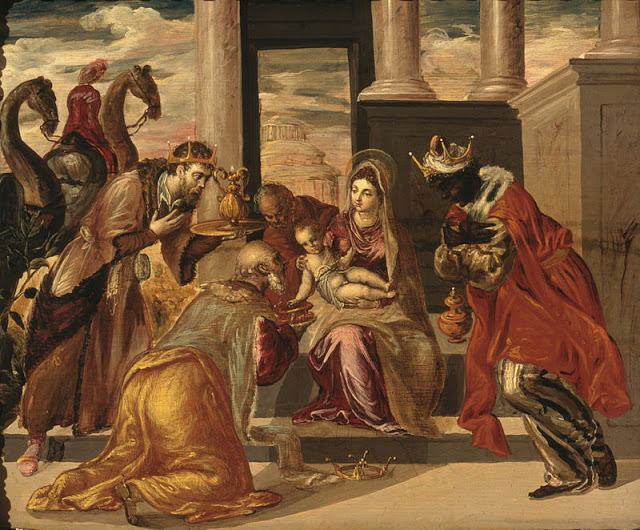Epiphany in Greece – Theophania – Ton Foton – 6 January

Lucky Diver
The sixth of January; the twelfth day of Christmas; Christmas has officially come to an end and it is Epiphany; called “Ton Foton” in Greece.
“The Festival of Lights”
This Feast Day is known as “Theophania” meaning; a vision of God, or, “Christ shining through”.
Epiphany is one of the most meaningful celebrations for The Greek Orthodox Church, being third only in rank, behind Easter and Pentecost.
6th of January is also known as “Three Kings Day”, in the Western Church a celebration of “The Three Magi” visiting baby Jesus.
We’ve all heard the Christmas Carol “We Three Kings”, which was dedicated to this event.

Adoration of The Magi – El Greco 1568
In The Greek Orthodox Church, Epiphany, or, “Ton Foton” (The shining forth), is celebrated as the announcement of Jesus Christ as The Messiah and as second person of The Trinity at his baptism, by John the Baptist in the River Jordan.
Another cause for celebration in The Greek Orthodox Church at Epiphany, is the fact that Christ’s baptism, is only one of two occasions, when all three persons of The Trinity showed themselves at the same time to mankind:
God The Father, speaking from the clouds, God The Son, being baptized in The River Jordan, and, God The Holy Spirit, revealed as a dove, descending from heaven.
(The other occasion was the “Transfiguration” on Mount Tabor)
Russian icon of the Theophany. – Kirillo-Belozersky Monastery. 1497
Greek Epiphany Traditions
At Epiphany The Greek Orthodox Church performs;
“The Great Blessing of the Waters”
This ceremony, performed twice, once, on The Eve of Epiphany (A day of fasting), performed in the church and again on the actual day, outdoors, with priests blessing the sea, rivers and lakes etc.
A priest, surrounded by brave young men and boys throws a cross into the sea, either from the harbour, or from a boat at sea.

Preparing to hurl the Cross
The minute the cross leaves the priest’s hand is the signal for them to dive into the freezing water to catch it.

And they’re off!
The lucky one who finds and returns the cross is blessed by the priest;
I should think that the only thing on the divers mind at this point, is a warm towel and something hot to drink!

The Victor
As the cross is victoriously brought back, the priest releases white doves, as a symbol of The Holy Spirit.

The Dove as a Symbol of the Holy Spirit
This tradition is carried out to remember and to celebrate the Baptism of Christ and to bless the waters.
An awful lot of blessing is carried out on Epiphany.
Fishermen have their boats lined up, waiting for them to be blessed by the priest, once the daring divers are out of the way.
On the Eve of Epiphany the priest has made his house calls, with a bunch of fresh Basil, dipped into a bowl of holy water and shaken around every room, he blesses the house and anyone in his path will have the basil shaken at them too!
Anything and everything is blessed!

House Calls
This is also the day that the naughty little imps, Kallikantzaroi, who came out for the twelve days of Christmas, being afraid of holy water, scuttle back to their underground homes.
Another quaint custom, one that I only learnt about today from my friend Christos, is that of collecting two pebbles from the beach.

Pebble – Photo Christos Katsoulas
They must be wet with sea water, taken home without drying and placed in the center of the house, as the pebbles dry, the evaporating sea water, which is considered blessed on this day, will bless your house.
Last but not least and probably the most looked forward to, as the day before Epiphany was a strict day of fasting, is the custom, of on arriving home after the celebrations, tucking into different types of delicious fried pastries.
These are traditionally; dipples, ribbons of fried pastry, covered in honey, or loukoumades, small round doughnuts, again covered in honey, that have been especially prepared for today.

Loukoumades
Water blessed at Epiphany, or, Theophania, the “Theophany Water” is believed to different to Holy Water, in that its very nature has been changed and has become pure, honourable and praiseworthy.
Epiphany/Theophania, as you may have guessed, is a traditional day in The Greek Orthodox Church, for baptisms.
Epiphany/Theophania, is followed by an eight day “Afterfeast”, meaning, all religious fasting is forgotten for these eight days, which is just as well, as it won’t be long now until fasting for Lent begins; forty days before Easter.
The sixth of January, Theophania, in The Greek Orthodox Church, is the name day of:
Fotis, Fotini, Fanis, Fani, Iordanis (Jordan) Ourania, Peristera, Theofanis, Theofania and Theopoula.
A Happy Name Day to you all.
Related links:
Saints and Celebrations of the Greek Orthodox Church



